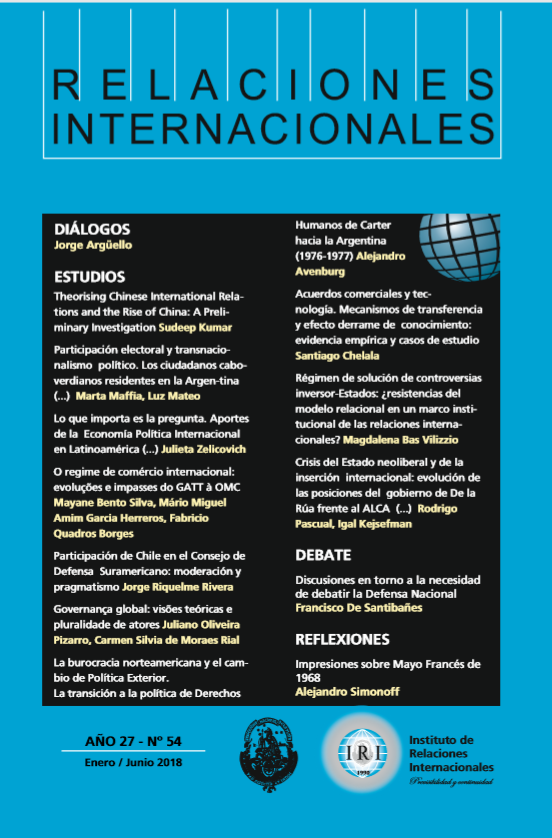American bureaucracy and foreign policy change. The transition to The U.S. human rights policy to Argentina under the Carter administration (1976-1977)
DOI:
https://doi.org/10.24215/23142766e030Abstract
This article analyzes the role of the State Department and of the U.S. Embassy in Buenos Aires during the implementation of Jimmy Carter’s human rights policy towards Argentina. Prior research has emphasized the reluctance of those sectors to implement this policy change. Using declassified documents from the U.S. State Department, we analyze two channels of implementation of this policy: economic and military sanctions, and private bilateral contacts. We argue that, while those actors opposed U.S. sanctions against Argentina, in private bilateral meetings they consistently supported measures that sought to improve the situation of human rights in Argentina.
Key Words: Human Rights, Bureaucracy, Carter, Argentina
Downloads
Downloads
Published
How to Cite
Issue
Section
License
Aquellos autores/as que tengan publicaciones con esta revista, aceptan los términos siguientes:
- Los autores/as conservarán sus derechos de autor y garantizarán a la revista el derecho de primera publicación de su obra. A partir de noviembre del 2020 los artículos se publicarán en la revista bajo una licencia Creative Commons Atribución- NoComercial-CompartirIgual 4.0 Internacional (CC BY-NC-SA 4.0). Acorde a estos términos, el material se puede compartir (copiar y redistribuir en cualquier medio o formato) y adaptar (remezclar, transformar y crear a partir del material otra obra), siempre que a) se cite la autoría y la fuente original de su publicación (revista y URL de la obra), b) no se use para fines comerciales y c) se mantengan los mismos términos de la licencia.
Previo a esta fecha los artículos se publicaron en la revista bajo una Licencia de reconocimiento de Creative Commons (BY-SA 2.5). - Los autores/as podrán adoptar otros acuerdos de licencia no exclusiva de distribución de la versión de la obra publicada (p. ej.: depositarla en un archivo telemático institucional o publicarla en un volumen monográfico) siempre que se indique la publicación inicial en esta revista.
- Se permite y recomienda a los autores/as difundir su obra a través de Internet (p. ej.: en archivos telemáticos institucionales o en su página web) antes y durante el proceso de envío, lo cual puede producir intercambios interesantes y aumentar las citas de la obra publicada. (Véase El efecto del acceso abierto).


























